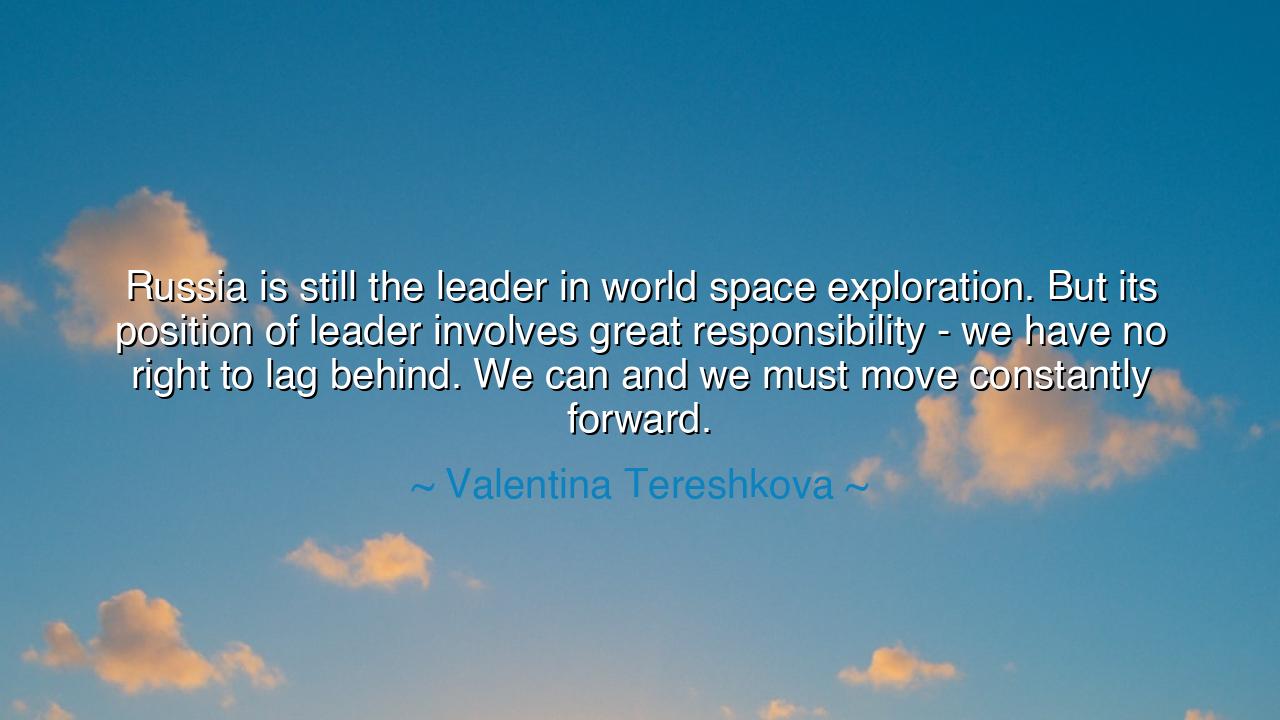
Russia is still the leader in world space exploration. But its
Russia is still the leader in world space exploration. But its position of leader involves great responsibility - we have no right to lag behind. We can and we must move constantly forward.






Hear now, O children of the future, the words of Valentina Tereshkova, whose voice rings with the wisdom of those who dare to dream beyond the stars. She declared, "Russia is still the leader in world space exploration. But its position of leader involves great responsibility - we have no right to lag behind. We can and we must move constantly forward." These words carry with them not just the weight of a nation’s ambition, but the deep, timeless truth that to lead is to bear a great responsibility, to carry the hopes of others upon one’s shoulders, and to push forward relentlessly, never allowing oneself to falter or retreat.
In the ancient world, the role of a leader was not merely one of power or domination, but of service and sacrifice. The Greeks, who built the foundations of philosophy and science, believed that a leader’s true purpose was to guide others with wisdom and foresight. The Spartans knew that their strength lay not in individual glory, but in the relentless pursuit of excellence and duty to their people. The role of the leader was always to serve, to take responsibility for the greater good, and to ensure that the future was shaped with care and vision. Tereshkova’s words echo this ancient ideal, reminding us that leadership is not about resting on one’s laurels, but about the constant striving to move forward, to grow, and to never allow the world to leave you behind.
The story of Russia’s journey into space is a tale of greatness and sacrifice, a narrative written with courage and a relentless desire to reach for the heavens. When Yuri Gagarin became the first man to orbit the Earth in 1961, he was not just a man, but a symbol of humanity’s boundless potential. He carried with him not only the pride of his people, but the weight of human ambition, reaching out to touch the stars. Yet Gagarin’s flight was not the culmination of the journey, but the beginning. It was the spark that ignited an era of exploration and discovery, and it is in this spirit of constant advancement that Tereshkova calls upon her nation to lead.
She understands that being the leader in space is not simply a matter of past achievement, but of future potential. It is a call to action, to continue the pursuit of the unknown with courage and resolve. The Soviet Union, and now Russia, have led the way in many areas of space exploration, from launching the first artificial satellite, Sputnik, to sending the first woman into space, Tereshkova herself. These accomplishments stand as testaments to the spirit of innovation and determination that have always defined Russia’s place in history. But as Tereshkova reminds us, leadership in such a field comes with the duty to advance—to never allow the light of discovery to fade, but to always seek new horizons.
Consider the tale of Alexander the Great, whose empire stretched from the shores of Greece to the farthest reaches of India. He was not content with his position as the conqueror of the known world; his ambition was not to rule, but to explore and understand the vast, uncharted territories of the earth. His leadership was defined not by what he had already achieved, but by the relentless drive to push forward. He knew that the moment a leader stopped striving was the moment they began to fall behind. The same can be said of Russia’s place in space—its history is rich with achievements, but its future depends on the constant pursuit of excellence and innovation.
Tereshkova’s message is clear: leaders must move forward—and they must do so with purpose and vision. It is not enough to rest upon past laurels; true leadership is defined by the willingness to face the unknown and to carry the torch of progress forward for the generations to come. Russia, in its role as a leader in space exploration, must continue to push the boundaries of what is possible, to advance not just for its own sake, but for the sake of humanity as a whole. The responsibility that comes with leadership is not a burden, but an opportunity to shape the future, to guide the world toward new frontiers.
So, O children of the future, take this lesson to heart: to lead is to serve. Whether you lead a nation, a family, or a community, your task is not merely to stand at the front, but to move forward, to always strive for betterment, for innovation, and for the betterment of the world around you. Like Tereshkova, who ventured into space and looked back at the Earth, you too must look beyond the horizon, always seeking new ways to grow, to discover, and to lead. The path of leadership is not a path of comfort or complacency, but one of constant growth and responsibility. Lead with courage, lead with purpose, and never stop moving forward. The future of the world depends on your willingness to continue the journey into the unknown.






AAdministratorAdministrator
Welcome, honored guests. Please leave a comment, we will respond soon